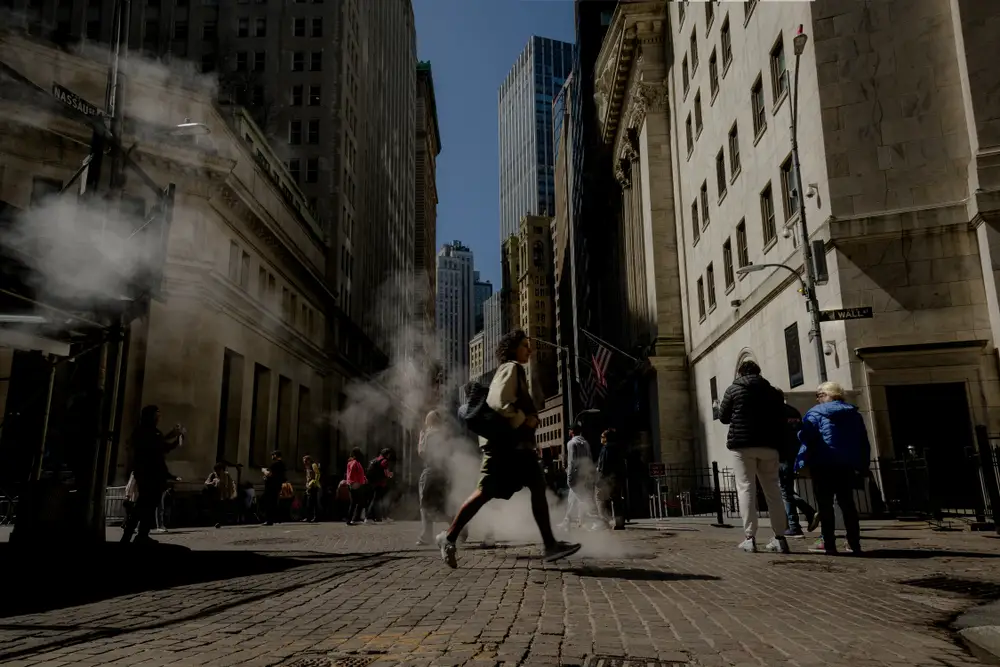Why Boeing’s $21 billion share sale is an early Christmas present for Wall Street

A woman crosses Wall Street
Wall Street bankers tasked with helping companies raise money through sales of stock just got an early Christmas present.
Boeing on Monday announced plans to sell $19 million worth of stock and depositary shares to stave off a credit downgrade during a costly workers’ strike.
The sale ended up raising nearly $21 billion, marking one of the largest deals for US equity-capital-markets bankers in history. Multiple banks participated in the offering. Among them were lead joint bookrunners Goldman Sachs, Bank of America, Citigroup, and JPMorgan; with assistance from firms including RBC Capital Markets, Morgan Stanley, and more. PJT Partners operated as Boeing’s financial advisor, the company said.
The sale, which exceeds the $16.5 billion Facebook raised in its record-breaking 2012 IPO, comes during a tough time for Wall Street generally and stands to lift year-end bonuses for ECM bankers, according to compensation expert Alan Johnson.
Johnson, who founded Johnson Associates, a consulting group that works on behalf of financial-services firms, told B-17 that he recently predicted that bonuses for equity-capital-markets and debt-capital-markets professionals would be up to the tune of 20% to 25% this year. Thanks to the Boeing capital raise, he now predicts ECM bonus increases of 30%, he said.
How much the Boeing stock sale contributes to any one bank’s bonus pool will, of course, vary depending on how much stock each bank sold on behalf of the aircraft maker, Johnson said.
Spokespersons for some of these firms did not respond or had no comment about the potential impact to compensation as a result of their work on Boeing’s raise.
‘A rising tide lifts all boats,’ comp expert says
The ultimate size of Boeing’s capital raise puts it in league with some of the largest raises ever, according to global equity capital raise data provided by LSEG. It was ranked the third-largest common-stock offering globally, according to S&P Capital IQ data reported by Semafor. The biggest was Brazilian oil company Petrobras, which raised nearly $41 billion in September 2010; followed by the British bank Lloyds, which raised more than $22 billion in 2009.
In terms of sheer volume, it far outpaces the proceeds raised from other IPOs and common stock raises so far this year, including the $2.7 billion Thoma Bravo raised by selling about half its shares in Nasdaq, according to data from LSEG. The largest IPO of the year, real-estate investor trust Lineage, raised just $4.4 billion, LSEG’s data shows.
For Boeing, the newly raised money comes as the company tries to push through headwinds.
It’s faced a rough go this year, reporting a loss of more than $6 billion in its earnings disclosure this month. The company has faced a series of safety concerns tied to issues with doors and mechanical components that have spooked investors. It’s also struggling as a strike of more than 30,000 workers, which began in September, continues. Its stock is down from a high of more than $251 per share at the start of 2024 to about $155 as of late October — a reduction of about 38%. All these forces have produced the need for additional capital at the aircraft manufacturer, hence its sale.
Broadly speaking, Wall Street dealmakers are in for a better year than they’ve had since the go-go days of investment banking in 2021 when liquidity was cheap and the deals market was on fire. Mergers are also returning, with multiple deals in the tens of billions closing, like candymaker Mars’ $36 billion acquisition of snack producer Kellanova. The signs of a thaw for dealmaking are here, and bankers are hoping 2025 will mark a return to springtime again.
Year-end comp should be “up across all of Wall Street,” explained Johnson, whose firm will publish its highly-anticipated annual incentive pay report in the coming weeks.
“This year is a little better. To some extent, it’ll hopefully be a lot better next year,” said Johnson, adding: “This is one of those years where pay is going to be up virtually everywhere. Some are going to be up 5%, some 10%.”
But, based on Johnson’s forecast, it seems those involved in the Boeing capital raise may find themselves flying highest on bonus day.






